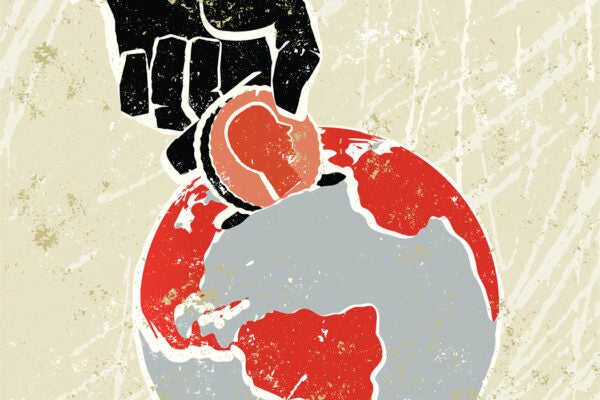Among the many sighs of relief over the French election results, you can also hear a few sighs of envy. How did France manage to repel the nationalist hordes—even if they represented a worryingly large portion of the electorate—instead of following in the footsteps of Brexit and Trump?
Credit some portion of this outcome to Minitel, the peculiar networking device that defined France’s relationship to the early internet, and set it on a uniquely democratic path. These widely-used, network-connected terminals introduced millions of customers of France Telecom to the power of online information, all the way back in the 1980’s and 1990’s. In contrast to most of the developed world, where networked information arrived via PCs and the internet, Minitel gave the French a very specific experience of the digital realm.
To understand how different Minitel was from the early, PC-based experience of the Internet, it’s useful to read Eric Schickler’s 1994 description of the platform:
Minitel’s initial stated purpose was to replace paper phone directories with a terminal linked to a new telephone system that the national phone company was in the process of installing. The terminal is provided free of charge to residential phone customers, and for a nominal fee to businesses. By 1991, over 5 million terminals were in use. The terminal and phone line serve as a gateway to thousands of information services that have proliferated for customers….There is a special free public information service that provides news from a variety of sources. The charges for other services are on a per-call basis, and are relatively inexpensive….Minitel can be used by individuals for electronic mail and messaging (with privacy), as well as to send out more public messages. ..The terminals themselves are basic, commodity items that the government purchases for about $150 and provides for free to phone customers. Minitel is designed to be cheap and accessible to individuals who lack technical expertise.
I first encountered Minitel on a visit to France twenty years ago, when the device already felt like a digital curiosity. I was spending a few days with a friend in Brittany, where I was welcomed into the family home with open arms as soon as my friend’s mother discovered I was a longtime activist in Canada’s social democratic party. The only thing that stood me in greater stead with this lifelong socialist was the revelation that I was an internet researcher: she immediately offered to show me her beloved Minitel. Minitel was the the digital realization of her proletariat identity, bringing the information access formerly limited to Parisian academics all the way out to her oceanside cottage.
The grassroots, egalitarian character of Minitel was a distinct part of its appeal, and of its early and long-lasting success. In her history of French cyberculture, Heather L. Moulaison writes that:
Since the Minitel was government-controlled through France Telecom, it was a means of providing information to the entire French population. Creators strove to ensure that Minitel commands would be straight forward and intuitive, guaranteeing that Minitel use would be within the grasp of all French users.
That widespread access meant that French politics started its move online well before online campaigning became the norm in other democracies. In 1987, Leda LeBrun was already able to observe that, thanks to Minitel:
Interacting with political parties and candidates was easy—indeed, much of this was done during the March 1986 elections. One did not need to be famous or rich to do politics, Minitel style, either. Activist friends of ours in the peace movement purchased a microcomputer and software, at relatively low cost, to communicate with their comrades and the curious.
Not that everything on Minitel was so high-minded. As with the Internet, the network’s growth owed a major debt to the sexual proclivities of its users. Mobley and Wilson note that:
As time passed, the success of the Minitel was based largely on what was called “Minitel Rose,” or “Pink Minitel,” referring to the use of the Minitel for access to soft pornography and chat rooms. Although this use of the Internet was discouraged by the government and frowned upon by the public at large, the funds generated by Pink Minitel usage were what helped anchor the Minitel as a functional, profitable system.
But despite (or perhaps because of) that sizable market of porn consumers, Minitel eventually faced competition in the form of the larger internet. In their assessment of government-led tech innovation, Jain et al note that:
the Minitel system achieved widespread use before the Internet became popular and was internationally acknowledged as a government intervention success story. However, the same Minitel system caused delays in the adoption of the Internet in France because the Internet was perceived as a threat.
Moulaison notes that by the late 1990’s, the French government of Prime Minister Lionel Jospin was determined to “wean” France off the Minitel in order to join the larger internet. By 2001, France had more internet users than Minitel users , although it would take more than a decade before the experiment ended, and its many terminals retired to the junkyards of France.

France)
Minitel was formally shuttered in 2012, but its legacy lives on in the peculiar character of French cyberculture. Five years after the country bid Minitel adieu, France has a new reason to wax rhapsodic about its quirky path into the digital realm. For it was the experience of Minitel that imbued the French digital experience with expectations of equitable and reliable information access, and arguably inured French internet users to the siren song of fake news and clickbait.
Obviously, those temptations haven’t been entirely contained: Marine LePen’s far-right Front National has been notoriously successful in building an online fan base, and just weeks before the election, Facebook terminated 30,000 fake accounts in France as part of its efforts at combatting fake news.
Nonetheless, when compared to recent votes in other countries, the French election looks like a victory for wiser heads prevailing in the face of online misinformation. And if France has succeeded in swimming against the tide of online political madness, that’s because it’s had long practice in forging its own path online. As Moulaison writes in her appraisal of French cyberculture:
From the mid-1980s to the late 1990s, the French cultivated online access in a way that was egalitarian, simple, and government-protected by means of the Minitel. With the transition to an information-based society after World War II, there emerged the threat of imposed foreign languages and cultures.…. This threat was neutralized in France, for a certain amount of time and to a certain extent, by the ubiquity of the Minitel.
Minitel might be gone, but the threat neutralization continues. Indeed, now that France is part of the global internet, we might hope that the lessons and experience of Minitel will infect the rest of us.







